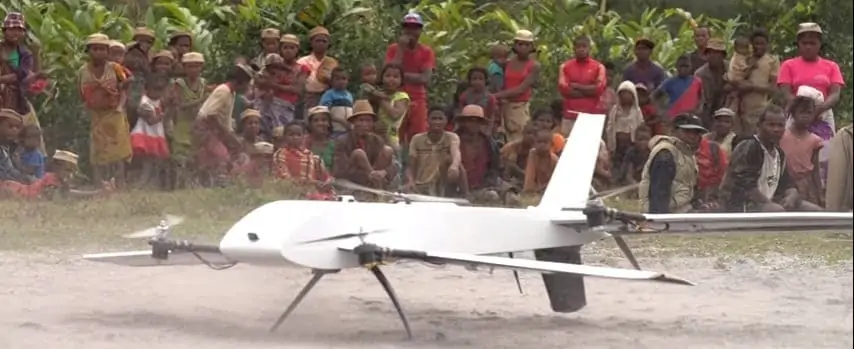Vayu, Inc. and Stony Brook University, with support from the Madagascan government and backing from the United States Agency for International Development (USAID), have completed the first ever series of long-range, fully autonomous drone flights transporting blood and stool samples from rural villages to centralized labs.
The exercise was undertaken to demonstrate how drones can be used to improve healthcare for vulnerable rural communities, where delivery of care is hampered by poor or non-existent roads. The samples were flown from villages in rural Madagascar to Stony Brook University’s Centre ValBio research station, for further testing. The unique ability of Vayu’s drone to take off and land like a helicopter and fly long distances could help vulnerable remote communities get the medical care they deserve.
Watch the video:
“The flights to and from villages in the Ifanadiana district [of Madagascar] ushers in a new era in bringing healthcare to people living in really remote settings,” said Dr. Peter Small, the Founding Director of Stony Brook’s Global Health Institute. “This would not have been possible without the support of the government and people of Madagascar “In this context drones will find innumerable uses such as accelerating the diagnosis of tuberculosis and ensuring the delivery of vaccines.”
Like many of the diseases that plague developing countries, the diagnosis can only be done in a lab and blood and stool samples must be transported quickly. Aware of the lack of roads leading to the communities most heavily burdened by these disease, faculty and students from Stony Brook University Medical Center sought out innovative solutions. They partnered with Vayu, Inc., a startup that was founded with the specific purposes of developing first-of-its-kind medical delivery drones as a way to transport blood, stool and tissue samples to the Centre ValBio research station for quick evaluation diagnosis. Ultimately, this partnership will be able deliver the proper medications in the most timely and urgent manner, putting these communities on the road to better health.
“Vayu’s accomplishment is as significant for the field of public health in developing countries, where limited access hinders healthcare as it is for the future of autonomous unmanned vehicles,” said Vayu’s CEO, Daniel Pepper, a former international journalist and medical student-turned-founder of Vayu.



















